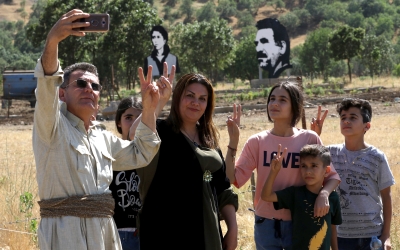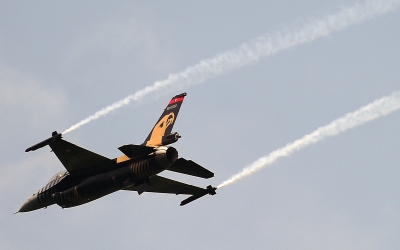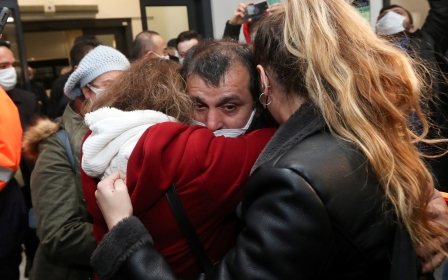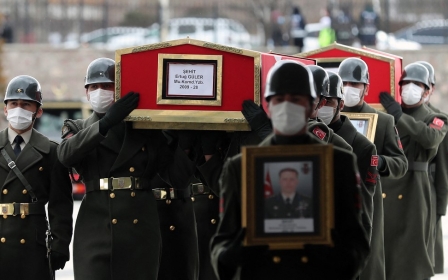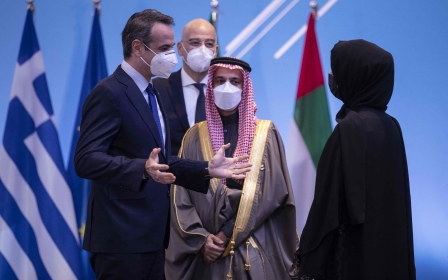Turkey: Hundreds arrested after PKK's execution of 13 hostages
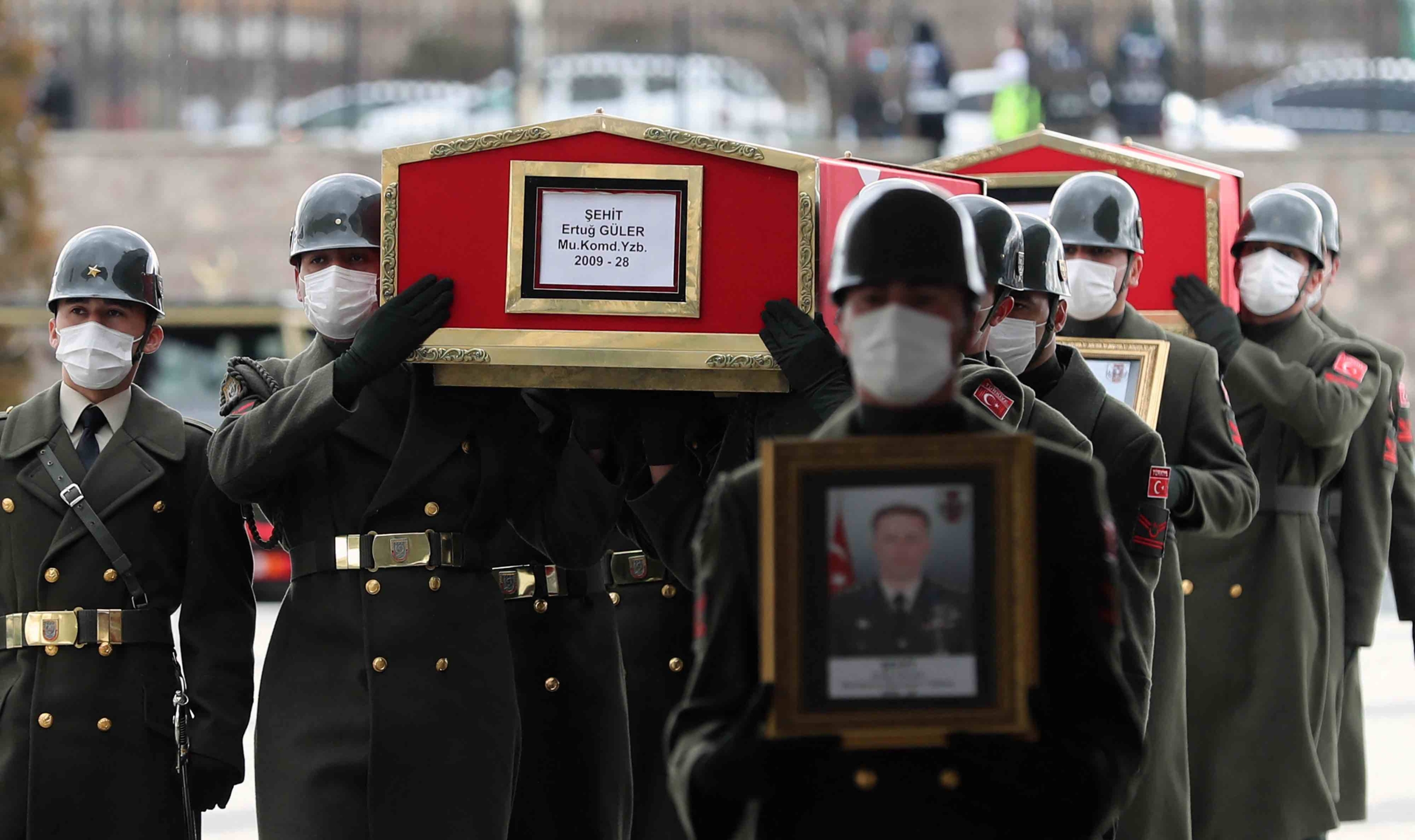
Turkey on Monday announced the detention of 718 people suspected of having links to the Kurdistan Workers' Party (PKK), a day after the militant group executed 13 Turks in northern Iraq.
The mass arrests were announced as President Recep Tayyip Erdogan scolded Washington for allegedly giving weapons to the PKK.
“You said you weren’t taking a side with the PKK and YPG. You are actually with them. You are behind them,” Erdogan said, during a televised address.
According to a readout released by the US State Department, Secretary of State Antony Blinken later on Monday told Turkish Foreign Minister Mevlut Cavusoglu in a first contact since he has taken office that "PKK terrorists" bear responsibility for the execution of the hostages.
The PKK insurgency and Turkish operations against the group are believed to have resulted in at least 40,000 deaths since the conflict began in 1984.
New MEE newsletter: Jerusalem Dispatch
Sign up to get the latest insights and analysis on Israel-Palestine, alongside Turkey Unpacked and other MEE newsletters
The Turkish government has repeatedly accused the US of providing the weapons used against it by Kurdish militants.
Turkey's foreign ministry on Monday summoned the US ambassador, David Satterfield, to reprimand him over what is perceived by Ankara as conditional condemnation.
"We strongly conveyed our dissatisfaction with the US statement. It is unacceptable that an ally questions [the Turkish official] statements released by the highest levels," a senior Turkish official told Middle East Eye, on condition of anonymity.
Even though the US and the EU had designated the PKK as a terror group, US President Barack Obama's administration opted to partner with the Kurdish People’s Protection Units (YPG) in the fight against the Islamic State (IS) group in 2014.
The Syrian Kurdish YPG has extensive ties with the PKK. Mazloum Abdi Kobani, the de facto leader of the armed group, acknowledged the existence of PKK fighters within YPG ranks in several statements.
The Biden administration reacted to the execution of the Turkish hostages, comprised mostly of kidnapped police officers and soldiers, with some civilians.
“If reports of the death of Turkish civilians at the hands of the PKK, a designated terrorist organisation, are confirmed, we condemn this action in the strongest possible terms,” State Department spokesperson Ned Price said in a formal statement on Sunday night.
Erdogan, however, said during his remarks that the State Department's condemnation of the killings was not serious.
“[The US] has brought thousands of trucks of tanks and ammunition to northern Iraq. And they delivered them to terrorists. If we are together within Nato, if we are to continue our solidarity, you will be sincere. You won’t be siding with the terrorists,” the Turkish president said.
Hostages identified
On Sunday, Ankara said that 13 Turks had been found executed in a cave in northern Iraq, while 48 PKK militants had been killed in an operation launched against the group on 10 February.
The defence ministry posted the names and images of some of the hostages on Twitter. They included two police officers and five military personnel.
Defence Minister Hulusi Akar also said that three Turkish soldiers had been killed and three others wounded during the fight with the PKK.
Akar said 12 of the kidnapped Turks had been shot in the head and one in the shoulder. The hostages had been held for six years in the mountains of northern Iraq. Akar said they had been shot by their PKK captors as Turkish troops were about to stage a rescue operation.
According to a statement released by the Malatya governor's office on Monday, the names of the murdered hostages were as follows: Air specialist sergeant Huseyin Sari, sergeant Semih Ozbey, specialist gendarme sergeant Umit Gicir, specialist sergeant Mevlut Kahveci, private Sedat Sorgun, private Suleyman Sungur, tank crewman Adil Kabakli, tank crewman Muslum Altintas, police officer Sedat Yabalak, police officer Vedat Kaya, and private citizens Aydin Kose and Muhammet Salih Kanca.
The governor’s office said the efforts to identify the last hostages were underway.
PKK blames Turkey
Meanwhile, the PKK, in a statement on Sunday, claimed that the hostages had been killed during heavy aerial bombardment by the Turkish military.
In response, the Malatya governor, Aydin Barus, said that the autopsies refuted the PKK's claims.
“Based on the findings of an autopsy, which was performed by the prosecutor and forensic experts at the Malatya Institute of Forensic Medicine, it has been established that [our citizens] were shot from close range and there were entry and exit wounds located in the heads of 12 individuals and the chest of one individual."
Moreover, an association with ties to Kurdish movements said the evidence suggested that the PKK's claim was unlikely to be true.
Ozturk Turkdogan, chairman of the Turkish Human Rights Association (IHD), told Turkish media that a family which identified one of the hostages confirmed that there was a bullet wound in the head, as Turkish authorities had claimed.
In a separate statement, Turkdogan said that the Turkish military was also responsible for the deaths because it had ordered the operation, knowing the risks.
Middle East Eye delivers independent and unrivalled coverage and analysis of the Middle East, North Africa and beyond. To learn more about republishing this content and the associated fees, please fill out this form. More about MEE can be found here.


